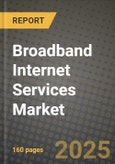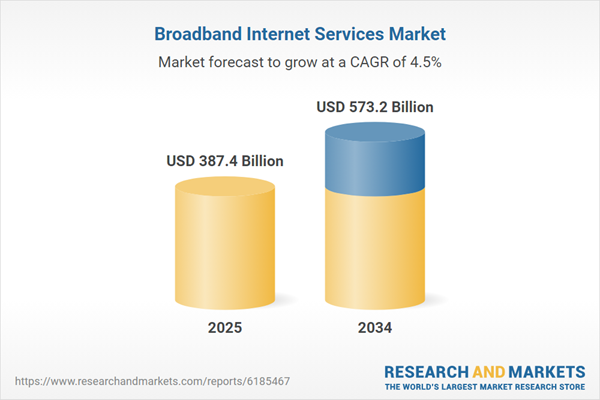The broadband internet services market is a critical component of the global telecommunications sector, delivering high-speed internet connectivity to businesses, households, and institutions. Broadband services encompass a variety of technologies, including DSL, cable, fiber-optic, satellite, and fixed wireless, each offering varying levels of speed, reliability, and coverage. As the internet becomes an increasingly indispensable part of daily life - supporting remote work, online education, e-commerce, streaming, and social networking - the demand for faster, more reliable broadband connections continues to rise.
Over the past decade, advancements in broadband infrastructure have transformed the way people access and use the internet. Fiber-optic networks, in particular, have gained prominence for their ability to deliver gigabit speeds, low latency, and robust reliability. Simultaneously, fixed wireless and satellite broadband services have expanded access in underserved rural and remote areas. Governments and private sector players are investing heavily in broadband deployment, recognizing its importance for economic growth, digital inclusion, and global competitiveness.
Regionally, North America and Europe lead the broadband services market in terms of penetration and speed, driven by strong investment in fiber networks and well-established regulatory frameworks. Meanwhile, Asia-Pacific is the fastest-growing region, fueled by rapid urbanization, increasing internet adoption, and ambitious government initiatives to expand connectivity. With continuous technological advancements, competitive pricing, and growing reliance on digital services, the broadband internet services market is poised for sustained growth and evolution.
Key Insights: Broadband Internet Services Market
Expansion of Fiber-Optic Networks: Fiber-optic technology is becoming the gold standard for broadband services due to its unmatched speed, reliability, and scalability. As costs decrease and demand for high-speed internet grows, fiber deployments are accelerating, particularly in urban and suburban areas.Rising Demand for Rural and Remote Connectivity: Fixed wireless and satellite broadband solutions are gaining momentum as providers work to close the digital divide. Advances in satellite technology, such as low Earth orbit (LEO) satellites, have made high-speed internet more accessible in remote and underserved regions.
Increased Focus on Smart Homes and IoT Connectivity: The proliferation of smart devices and IoT applications is driving demand for broadband connections that can handle multiple devices simultaneously. This trend is pushing providers to offer higher bandwidth and more robust service packages to meet the needs of connected households.
Growing Reliance on Digital Services: Remote work, online education, video conferencing, and streaming services have become integral to modern life. The need for reliable, high-speed internet connections to support these activities drives demand for advanced broadband services.
Government Initiatives and Funding Programs: Governments around the world are investing heavily in broadband infrastructure as part of economic recovery and digital inclusion efforts. Public-private partnerships and funding programs are accelerating the rollout of high-speed networks, particularly in rural and underserved areas.
Advancements in Network Technologies: Continuous innovation in networking technology, including the development of 5G fixed wireless access and improved satellite broadband solutions, has enhanced the quality, speed, and availability of broadband services, making them more attractive to a wider audience.
High Infrastructure Costs: Deploying fiber-optic networks and expanding broadband infrastructure to remote areas involves significant capital investment. High upfront costs can be a barrier, especially in regions with lower population densities or limited funding support.
Regulatory and Permitting Issues: Obtaining permits, navigating zoning regulations, and complying with government policies can slow down broadband deployment. Regulatory complexities may increase project timelines and costs, posing challenges for service providers.
Service Quality and Network Congestion: As more users adopt broadband services, networks face increased pressure to maintain speed and reliability. Managing network congestion, ensuring consistent performance, and meeting ever-growing bandwidth demands are ongoing challenges for providers.
Broadband Internet Services Market Segmentation
By Type
- C Band
- Ku Band
- Ka Band
By Application
- VoIP (voice over internet protocol)
- Internet TV
- Smart Home Application
- Remote Education
- Virtual Private LAN Service
- Interactive Gaming
- VPN on Broadband
By End User
- Business
- Household
- Other End-Users
Key Companies Analysed
- SES Astra Ltd.
- Inmarsat Co.
- Iridium Communications
- ViaSat India Pvt. Ltd.
- EchoStar Corp.
- EarthLink Holding Corp.
- Intelsat General Corp.
- Eutelsat Corp.
- Idirect
- Singtel Ltd.
- KVH Industries Co.
- Speedcast International Ltd.
- Gilat Satellite Networks
- Avonline Satellite Solutions Ltd.
- Skycasters LLc
- HISPASAT Group
- China Telecom Corp. Ltd.
- China Unicom Ltd.
- Comcast Corp.
- NTT Co.
- AT&T
- Deutsche Telekom Co.
- Time Warner Cable Communications
- Verizon Communications
- Orange SA
- Korea Telecom
- Cambium Networks Corporation
- Intracom Telecom Holdings SA
- RADWIN
- Redline Communications
- Proxim Wireless
- Charter Communications Inc.
- Altice USA Inc.
- Lumen Technologies Inc.
- Frontier Communications Parent Inc.
- Mediacom Communications Corporation
- Astound Broadband
Broadband Internet Services Market Analytics
The report employs rigorous tools, including Porter’s Five Forces, value chain mapping, and scenario-based modeling, to assess supply-demand dynamics. Cross-sector influences from parent, derived, and substitute markets are evaluated to identify risks and opportunities. Trade and pricing analytics provide an up-to-date view of international flows, including leading exporters, importers, and regional price trends.Macroeconomic indicators, policy frameworks such as carbon pricing and energy security strategies, and evolving consumer behavior are considered in forecasting scenarios. Recent deal flows, partnerships, and technology innovations are incorporated to assess their impact on future market performance.
Broadband Internet Services Market Competitive Intelligence
The competitive landscape is mapped through proprietary frameworks, profiling leading companies with details on business models, product portfolios, financial performance, and strategic initiatives. Key developments such as mergers & acquisitions, technology collaborations, investment inflows, and regional expansions are analyzed for their competitive impact. The report also identifies emerging players and innovative startups contributing to market disruption.Regional insights highlight the most promising investment destinations, regulatory landscapes, and evolving partnerships across energy and industrial corridors.
Countries Covered
- North America - Broadband Internet Services market data and outlook to 2034
- United States
- Canada
- Mexico
- Europe - Broadband Internet Services market data and outlook to 2034
- Germany
- United Kingdom
- France
- Italy
- Spain
- BeNeLux
- Russia
- Sweden
- Asia-Pacific - Broadband Internet Services market data and outlook to 2034
- China
- Japan
- India
- South Korea
- Australia
- Indonesia
- Malaysia
- Vietnam
- Middle East and Africa - Broadband Internet Services market data and outlook to 2034
- Saudi Arabia
- South Africa
- Iran
- UAE
- Egypt
- South and Central America - Broadband Internet Services market data and outlook to 2034
- Brazil
- Argentina
- Chile
- Peru
Research Methodology
This study combines primary inputs from industry experts across the Broadband Internet Services value chain with secondary data from associations, government publications, trade databases, and company disclosures. Proprietary modeling techniques, including data triangulation, statistical correlation, and scenario planning, are applied to deliver reliable market sizing and forecasting.Key Questions Addressed
- What is the current and forecast market size of the Broadband Internet Services industry at global, regional, and country levels?
- Which types, applications, and technologies present the highest growth potential?
- How are supply chains adapting to geopolitical and economic shocks?
- What role do policy frameworks, trade flows, and sustainability targets play in shaping demand?
- Who are the leading players, and how are their strategies evolving in the face of global uncertainty?
- Which regional “hotspots” and customer segments will outpace the market, and what go-to-market and partnership models best support entry and expansion?
- Where are the most investable opportunities - across technology roadmaps, sustainability-linked innovation, and M&A - and what is the best segment to invest over the next 3-5 years?
Your Key Takeaways from the Broadband Internet Services Market Report
- Global Broadband Internet Services market size and growth projections (CAGR), 2024-2034
- Impact of Russia-Ukraine, Israel-Palestine, and Hamas conflicts on Broadband Internet Services trade, costs, and supply chains
- Broadband Internet Services market size, share, and outlook across 5 regions and 27 countries, 2023-2034
- Broadband Internet Services market size, CAGR, and market share of key products, applications, and end-user verticals, 2023-2034
- Short- and long-term Broadband Internet Services market trends, drivers, restraints, and opportunities
- Porter’s Five Forces analysis, technological developments, and Broadband Internet Services supply chain analysis
- Broadband Internet Services trade analysis, Broadband Internet Services market price analysis, and Broadband Internet Services supply/demand dynamics
- Profiles of 5 leading companies - overview, key strategies, financials, and products
- Latest Broadband Internet Services market news and developments
Additional Support
With the purchase of this report, you will receive:- An updated PDF report and an MS Excel data workbook containing all market tables and figures for easy analysis.
- 7-day post-sale analyst support for clarifications and in-scope supplementary data, ensuring the deliverable aligns precisely with your requirements.
- Complimentary report update to incorporate the latest available data and the impact of recent market developments.
This product will be delivered within 1-3 business days.
Table of Contents
Companies Mentioned
- SES Astra Ltd.
- Inmarsat Co.
- Iridium Communications
- ViaSat India Pvt. Ltd.
- EchoStar Corp.
- EarthLink Holding Corp.
- Intelsat General Corp.
- Eutelsat Corp.
- Idirect
- Singtel Ltd.
- KVH Industries Co.
- Speedcast International Ltd.
- Gilat Satellite Networks
- Avonline Satellite Solutions Ltd.
- Skycasters LLc
- HISPASAT Group
- China Telecom Corp. Ltd.
- China Unicom Ltd.
- Comcast Corp.
- NTT Co.
- AT&T
- Deutsche Telekom Co.
- Time Warner Cable Communications
- Verizon Communications
- Orange SA
- Korea Telecom
- Cambium Networks Corporation
- Intracom Telecom Holdings SA
- RADWIN
- Redline Communications
- Proxim Wireless
- Charter Communications Inc.
- Altice USA Inc.
- Lumen Technologies Inc.
- Frontier Communications Parent Inc.
- Mediacom Communications Corporation
- Astound Broadband
Table Information
| Report Attribute | Details |
|---|---|
| No. of Pages | 160 |
| Published | October 2025 |
| Forecast Period | 2025 - 2034 |
| Estimated Market Value ( USD | $ 387.4 Billion |
| Forecasted Market Value ( USD | $ 573.2 Billion |
| Compound Annual Growth Rate | 4.4% |
| Regions Covered | Global |
| No. of Companies Mentioned | 37 |









